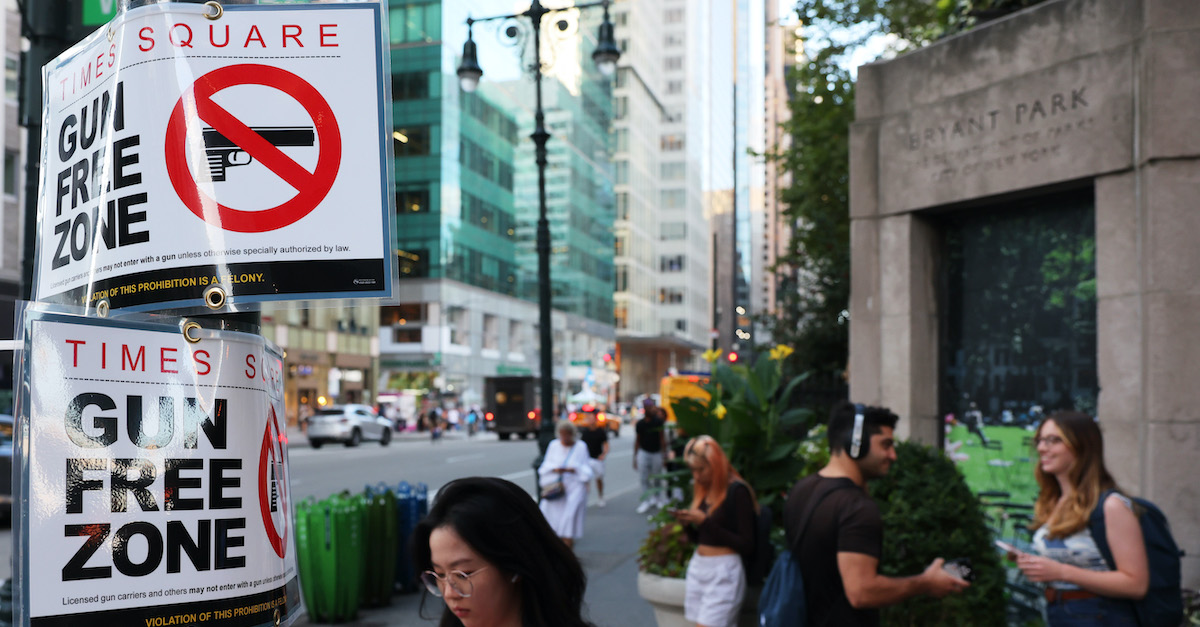
A “Gun Free Zone” sign posted on 41st Street and 6th Avenue on Aug. 31, 2022 in New York City. (Photo by Michael M. Santiago/Getty Images)
Drawing more than 131 million pedestrians per year, New York City’s Times Square — one of the world’s most visited places — cannot be cordoned off as a “Gun Free Zone,” a federal judge ruled on Thursday.
Under the terms of 53-page decision and temporary restraining order, New York also cannot restrict concealed carry guns in subways, buses, museums and other “sensitive locations.” For now, all of the provisions of the law remain in effect because the judge stayed his order to allow the state to appeal.
New York Attorney General Letitia James (D) made clear that she will fight the decision.
“Today’s decision comes in the wake of mass shootings and rampant gun violence hurting communities here in New York and across the country,” James wrote. “While the decision preserves portions of the law, we believe the entire law must be preserved as enacted. We will appeal this decision.”
“Common-sense gun control regulations help save lives,” she continued. “I will not back down from the fight to protect New Yorkers from repeated and baseless attacks on our state’s gun safety measures. I will continue to defend our responsible gun laws and fight for the safety of everyday New Yorkers.”
If not overturned, the ruling will strike down broad swaths of a concealed carry law speedily enacted by New York Gov. Kathy Hochul (D) after the Supreme Court gutted the Empire State’s licensing regime, in a significant expansion of the Second Amendment. After the Supreme Court ruling came down in June, New York passed the Concealed Carry Improvement Act in July.
U.S. District Judge Glenn T. Suddaby, a George W. Bush appointee, found that the several provisions of New York’s new law couldn’t pass the test established by Justice Clarence Thomas this past June that they must be “consistent with this Nation’s historical tradition of firearm regulation.”
“Simply stated, instead of moving toward becoming a shall-issue jurisdiction, New York State has further entrenched itself as a shall-not-issue jurisdiction,” Suddaby wrote. “And, by doing so, it has further reduced a first-class constitutional right to bear arms in public for self-defense (which, during the 19th and 18th centuries in America, generally came with an assumption that law-abiding responsible citizens were not a danger to themselves or others unless there was specific ground for a contrary finding) into a mere request (which is burdened with a presumption of dangerousness and the need to show ‘good moral character’).”
Suddaby blocked provisions of the law forcing those applying for concealed carry permits to provide a list of family and co-inhabitants, a list of the applicant’s social media accounts over the past three years and an in-person meeting.
The judge decidedly pruned the list of sensitive places, including “summer camps,” on the grounds that they are not grounded in U.S. history and tradition. He also ruled broadly against restrictions on passengers on public transportation packing heat.
“Based on the historical analogues located thus far, it does not appear permissible for New York State to restrict concealed carry in ‘any place, conveyance, or vehicle used for public transportation or public transit, subway cars, train cars, buses, ferries, railroad, omnibus, marine or aviation transportation; or any facility used for or in connection with service in the transportation of passengers, airports, train stations, subway and rail stations, and bus terminals,'” the ruling states.
Suddaby also found against the regulations for “any place used for the performance, art entertainment, gaming, or sporting events such as theaters, stadiums, racetracks, museums, amusement parks, performance venues, concerts, exhibits, conference centers, banquet halls, and gaming facilities and video lottery terminal facilities as licensed by the gaming commission” — or places where alcohol is consumed.
The “sensitive locations” where Suddaby found New York cannot prevent concealed carry of weapons include healthcare centers, libraries, playgrounds, public parks, and zoos, among many others.
Read the ruling, below: